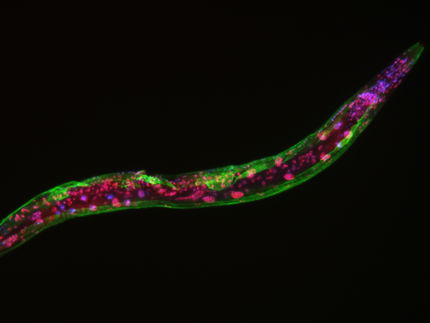The smell of food controls cellular recycling and affects life expectancy
The smell of food affects physiology and aging. That is the result of research conducted on the model organism of the roundworm by a research team led by Professor Thorsten Hoppe at the Cluster of Excellence for Aging Research (CECAD). Surprisingly, this relationship is due to a single pair of olfactory neurons.

The smell of food induces a variety of physiological processes in our body.
Republica, pixabay.com, CC0
The smell of food induces a variety of physiological processes in our body. Thus, the production of saliva and digestive enzymes is stimulated before the actual food intake in order to prepare the gastrointestinal tract for the upcoming digestive process. In a healthy organism, this coordination depends on a dynamic balance between formation and degradation of proteins (proteostasis). This plays an important role for the recycling of cells and during the aging process.
Scientists of Thorsten Hoppe’s lab at CECAD, the Cluster of Excellence for Aging Research at the University of Cologne, have now succeeded in demonstrating the influence of food odors on proteostasis. The experimental investigations were carried out in the roundworm Caenorhabditis elegans, a fundamental model organism of modern biomedical research. Their finding: two of the 358 neurons that form the nematode nervous system are part of the olfactory system, and thus important for odor perception.
The researchers were able to uncover the influence of smelling on the physiology of the digestive tract by investigating the recycling of green fluorescent proteins in the intestine. The brighter the green fluorescent signal within the worms, the more severe the accumulation of cellular waste, strongly correlating with defective protein degradation.
The underlying processes are mediated by the regulatory microRNA molecule mir-71. This molecule regulates the genetic programme of olfactory neurons and, afterwards, degradation processes in the digestive tract. However, if this mechanism is blocked, not only are cellular recycling processes diminished, the animal’s lifespan is also reduced. In other words, roundworms with a non-functional ‘sense of smell’ live much shorter – a strong indication for its physiological significance.
This mechanism is central for the proper processing of odour signals and mediates adjustments in the intestinal cells. ‘We assume that the organism coordinates food intake and effective degradation this way’, commented first author Dr. Fabian Finger, who was recently awarded with the Klaus Liebrecht Prize of the UoC for his work.
‘The impact of odours at the cellular level is a poorly investigated field’, says Thorsten Hoppe. ‘It is well known that malfunctions in odour perception are associated with neurodegenerative diseases. We will further investigate the influence of the perception of odours on aging-associated disorders such as Alzheimer’s or Parkinson’s disease.’
Original publication
Most read news
Original publication
"Olfaction regulates organismal proteostasis and longevity via microRNA-dependent signalling"; Fabian Finger, Franziska Ottens, Alexander Springhorn, Tanja Drexel, Lucie Proksch, Sophia Metz, Luisa Cochella und Thorsten Hoppe; Nature Metabolism; 2019
Topics
Organizations
Other news from the department science

Get the life science industry in your inbox
By submitting this form you agree that LUMITOS AG will send you the newsletter(s) selected above by email. Your data will not be passed on to third parties. Your data will be stored and processed in accordance with our data protection regulations. LUMITOS may contact you by email for the purpose of advertising or market and opinion surveys. You can revoke your consent at any time without giving reasons to LUMITOS AG, Ernst-Augustin-Str. 2, 12489 Berlin, Germany or by e-mail at revoke@lumitos.com with effect for the future. In addition, each email contains a link to unsubscribe from the corresponding newsletter.





















































